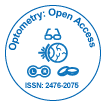开放获取期刊获得更多读者和引用
700 种期刊 和 15,000,000 名读者 每份期刊 获得 25,000 多名读者
抽象的
Attitudes and Beliefs of Undergraduate Students to Spectacle Wear
Agyemang-Mireku Felix and Essien Ebenezer
Purpose: The aim of the study was to determine the attitudes and beliefs of KNUST undergraduates to spectacle wear.
Method: A descriptive cross-sectional study was done. Close ended questionnaires were distributed to 500 KNUST undergraduates to collect data on their attitudes and beliefs to spectacle wear.
Results: A total of 500 undergraduates from the Kwame Nkrumah University of Science and Technology (KNUST) were included in this study. 298 were males (59.6%) and 202 (40.4%) were females with age ranging from 17-32 years (mean 21.51 ± 1.93SD). 76% of the study population had heard of refractive error (near-sightedness, far sightedness or astigmatism) before. 57.4% felt that spectacles could be used to correct refractive error. 61% agreed they would wear spectacles if they were prescribed by an eye doctor. 53.4% believed eyeglasses cause the eyes to be pushed in and 66.9% believed eyeglasses are an inconvenience. Two-thirds (66%) did not know that eyeglasses could be used to relieve other forms of ocular discomfort like headache and tearing. 54.2% of respondents saw people who wore eyeglasses as visually handicapped, while 14.6% believed that eyeglasses were meant for old people. 27.8% of the respondents believed that they would be teased if they wore glasses. 57.2% said people who wear spectacles look professional.
Conclusion: Spectacles are still the most commonly preferred modality for the correction of refractive errors in the world today. Acceptance of glasses for the correction of refractive errors among KNUST undergraduates is not encouraging. There still lingers in the minds of the educated population, certain misconceptions regarding refractive errors and the various methods of correction which needs to be addressed. Counselling, mass media, support groups and the provision of information about refractive errors in schools and college textbooks, will help in dispelling the misconceptions and the distorted facts about these.

 English
English  Spanish
Spanish  Russian
Russian  German
German  French
French  Japanese
Japanese  Portuguese
Portuguese  Hindi
Hindi